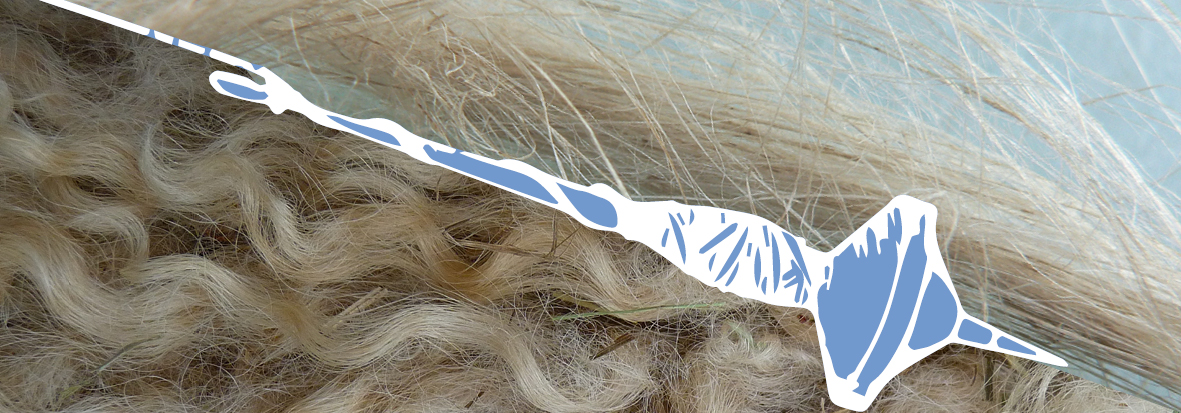
Early textile production was linked to raw material procurement strategies. Fibre treatment and processing greatly depend on both, the nature and the quality of the resources that are used, as well as on the desired end products. Fortunately, the different modes of exploitation and use leave recognizable traces in the archaeological record. Especially the studies of textile production processes provide different strains of evidence for the investigation of technological adaptations.
The major focus within the Topoi Textile Revolution interdisciplinary research group was on the introduction and intensification of wool use.For our final synthetic workshop we would like to broaden the focus by considering and exploring plant and animal raw materials that are represented in the early phases of fibre production.
The aim of the meeting “The competition of fibres” is to stimulate discussions on the relationship between different fibre resources and modes of their exploitation. Special attention will be given to the textile production process. The development of fibre material advantages should be reviewed in a broader context of environmental, cultural, economic and social causality.
Download: The Competition of Fibres| Abstracts | Booklet [PDF 1.03 MB]
8.3.2017 | |
15:00 - 15:15 | Welcome and opening |
15:15 - 15:45 | Early Wool of Mesopotamia, ca. 7000-3000 BC. Between Prestige and Economy Catherine Breniquet |
15:45 - 16:15 | Linen Textiles Production – Continuity and Discontinuity from the Neolithic Period to the Chalcolithic Period in the Southern Levant Orit Shamir |
16:15 - 16:45 | Coffee break |
16:45 - 17:15 | Fibers, Fabrics, and Looms: A link between animal fibers and warp weighted looms in the Iron Age Levant Thaddeus Nelson |
17:15 - 17:45 | Archaic, male exclusive, loom from Oman Janet Levy |
19:15 - 20:15 | The Neolithic Revolution in the Fertile Crescent and the origins of fiber technology Ofer Bar Yosef |
9.3.2017 | |
09:00 - 09:30 | The Topoi Research Group 'Textile Revolution' - archaeological background and multi-proxy approach Wolfram Schier |
09:30 - 10:00 | Fibres to Fibres, Thread to Thread. Comparing Diachronic Changes in Large Spindle-whorl Samples Ana Grabundzija Chiara Schoch |
10:00 - 10:30 | Finding the woolly sheep: meta-analyses of archaeozoological data from SE-Europe and the Near East Cornelia Becker Norbert Benecke Hans Christian Küchelmann |
10:30 - 11:00 | Proxy evidence for early pastoral subsistence following an environmental approach Martin Park (geb. Schumacher) |
11:00 - 11:30 | Coffee break |
11:30 - 12:00 | Taming the fibers. Tradition and innovations in the textile cultures of Neolithic Greece Kalliope Sarri |
12:00 - 12:30 | Ex Oriente Ars ? Anatolianizing spindle-whorls in the Early Bronze Age Aegean and their implications for fiber crafts Sophia Vakirtzi |
12:30 - 13:30 | Lunch break |
13:30 - 14:00 | Flax, wool or both? Evidence for different types of fibres in Early Bronze Age Greece (3rd Millennium BC) Malgorzata Siennicka |
14:00 - 14:30 | Different skills for different fibres? The use of flax and wool in textile technology of Bronze Age Greece in light of archaeological experiments Agatha Ulanowska |
14:30 - 15:00 | Coffee break |
15:00 - 15:30 | Fibres for Splicing - Technology and Technique in the Ancient Mediterranean Margarita Gleba Susanna Harris |
15:30 - 16:00 | The Travelling Spinners of the 4th Millennium BC in the Balkans Vanya Petrova |
16:00 - 16:30 | Plants and plant fibres of the Eastern Baltic Littoral in the Neolithic – Bronze Age: experiments on processing and textile production Virginia Rimkute |
18:00 - 19:30 | Über die Archäobiologie im 20. Jahrhundert Helmut Kroll |
19:30 - 21:00 | Reception and buffet |
10.3.2017 | |
09:00 - 09:30 | Know-how about flax production of Neolithic farmers in the circum-alpine region Sabine Karg |
09:30 - 10:00 | "Verkannte Revolution", Bedeutung von Gehölzbast im Kontext neolithischer und frühbronzezeitlicher Textilien aus Feuchtbodensiedlungen Johanna Banck-Burgess |
10:00 - 10:30 | Wettbewerb der Fasern – Textile Materialien der Steinzeit und ihre Verarbeitung Anne Reichert |
10:30 - 11:00 | Coffee break |
11:00 - 11:30 | Hallstatt Textiles - Raw materials, Textile Technologies, Innovations and Cultural Response in Central Europe in the 2nd and 1st mill. BC Karina Grömer |
11:30 - 12:00 | Microscopic and archaeogenetic studies of hair Elena Nikulina Ulrich Schmölcke |
12:00 - 12:30 | Competing fibres: the plurality of clothing solutions Linda Hurcombe |
12:30 - 13:30 | Final discussion |
